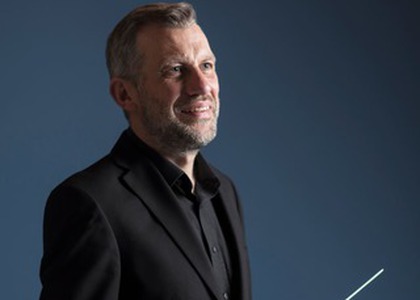> Interviews

Interview with conductor Rumon Gamba
On Friday, October 18th, conductor Rumon Gamba returns to the Radio National Orchestra for a concert featuring works by Felix Mendelssohn, Robert Schumann and Aaron Copland. This is also the topic of the discussion that Ioana Țintea had with the British musician.
What were the first rehearsals like?
They were very interesting. I don't think the orchestra has ever performed the Appalachian Spring suite before, or, if it has, it must have been a long time ago. Understanding the style of this music, with its complex and challenging rhythms, requires some time. But after a few days of rehearsal, the musicians truly start to get used to it.
What do you think of Aaron Copland's music?
I like his music very much. None of his works is easy;they are all demanding and difficult. I remember the time I worked on this sheet music with the New York Philharmonic Orchestra, the musicians needed some time to refinethe details. So it does take a while until everything turns out to be great, but I love it. The Appalachian Spring suite is a wonderful, melodious and enthralling work!
You will open the Friday concert at Sala Radio with Felix Mendelssohn'soverture "The Hebrides". What can we discover while listening to it?
It is simply amazing. It is changeablelike the weather in the Hebrides, located in the far north of Scotland, where Mendelssohn discovered that isolated cave. Sometimes, the sea is calm, some other times, the wind is strong, and a storm is about to begin. The music is constantly changing, just like Scotland's weather, which changes every few minutes.
Apart from the works by Felix Mendelssohn and Aaron Copland, the audience will also be able to listen to Robert Schumann's Concerto for piano and orchestra in A Minor. What do you think about the selection of the works?
I find it perfectly suitable. I think that there is always some sort of duality in Schumann's music; there is, of course, the darker, gloomier side of it, but, at the same time, the concert also has many joyful moments, which evoke the spring atmosphere, particularly the end of the work. That is why I believe this opus is in perfect harmony with the Appalachian Spring.
Have you ever worked with pianist Teo Gheorghiu before?
No, I haven't, but I have heard wonderful things about him and I'm looking forward to working with him.
Translated by Mara Scoroșanu,
University of Bucharest, Faculty of Foreign Languages and Literatures, MTTLC, year I
Corrected by Silvia Petrescu














